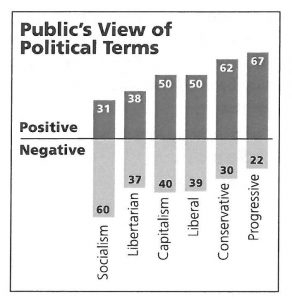IdeaLog
Call yourself a progressive
Posted on July 27, 2018
From blue states, we often hear the question, “Is it better to call yourself a liberal or a progressive?” From red states we’re asked, “Is it bad politics to call yourself a progressive when the jurisdiction seems conservative?” The answer to both is—say progressive.
A poll by the Pew Research Center compared common ideological terms. It demonstrated that progressive is the most positive political label in America. Conservative is the second most popular political brand. Liberal is substantially less popular, probably because many Americans think that a liberal favors the poor over the middle class.
This is not the only poll to draw the those conclusions. A few years ago, Lake Research Partners looked deeply into voters’ feelings about the term progressive. They found that Democrats, Republicans and persuadable voters all like a progressive candidate better than a liberal one. The biggest advantage in the progressive label comes from persuadables who are 13 points more favorable toward a progressive than a liberal candidate.
As long ago as 1978, I conducted a poll for a state senate candidate that found voters reacted much more favorably toward a candidate labeled progressive than one labeled liberal. But why?
In part, it’s because right wingers have tarnished “liberal.” In part, it’s because left-leaning groups have promoted “progressive.” There’s the Progressive Democrats of America and Progressive Change Campaign Committee. The slogan of the Center for American Progress is “Progressive Ideas for a Strong, Just and Free America.” Everyone now talks of “progressive values.” And of course, there is no Liberal Caucus in Congress—it’s called the Progressive Caucus.
This makes sense. Progressive sounds positive because it comes from the word progress. It gives the impression that progressives want to move forward, promote innovation and focus on the future—all popular ideas. Also, when progressive is compared side-by-side with conservative, we have an advantage because it sounds like pro versus con. On the other hand, the term liberal no longer benefits from the fact that it derives from the same Latin root as liberty and previously referred to laissez-faire policies. These days, nobody hears liberal and thinks of liberty—the word has lost its emotional center.
In the end, if you don’t label yourself, your opponents will label you. And in 2018 they will call you a “liberal,” a “socialist,” or something even farther afield. Progressive is popular, and more important, it’s not polarizing. Besides, we should be happy to be asked the question, “What is a progressive, anyway?” That gives us the chance to talk about our progressive values: freedom, opportunity and security for all.

